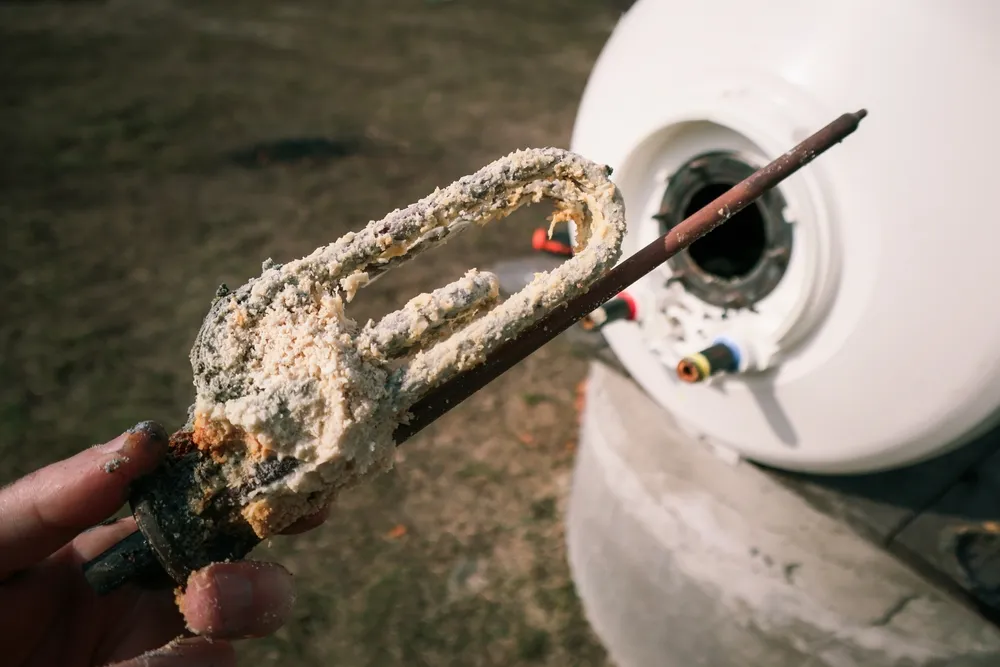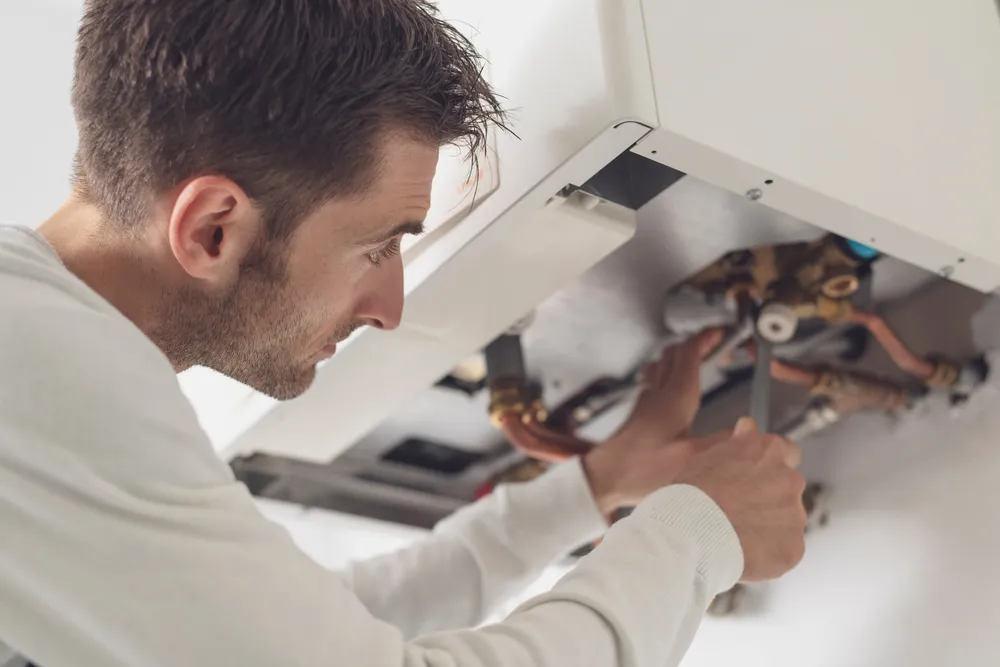Hot water is something most homeowners rely on daily, whether it’s for a warm shower, laundry, or washing up after dinner. But like any household appliance, your hot water system won’t last forever. Knowing how long it should last and how to maximise its effectiveness can save you from sudden cold showers and costly emergencies. Experts at Hop To It Plumbing understand the local climate, water conditions, and usage habits that impact system performance across Brisbane homes.
In this guide, we’ll cover the typical lifespan of different systems, the warning signs of failure, and practical tips to help extend their lifespan. You’ll also learn when it’s smarter to repair or replace, so you can make informed choices that suit your household and budget. Let's get started!

Common Signs Your Hot Water System Is Nearing the End
As your hot water system ages, it will often give off subtle (and sometimes not-so-subtle) signs that it’s on its way out. Recognising these early warnings can help you avoid inconvenient breakdowns and costly emergency replacements. Below are some of the most common indicators that your system may be nearing the end of its lifespan.
Inconsistent Water Temperature
One of the most apparent signs of a failing hot water system is inconsistent water temperature. If you notice that your water fluctuates between hot and cold, or it takes longer than usual to heat up, it might indicate a problem with the heating elements or a failing thermostat. This inconsistency can lead to inefficient energy use that could increase your utility bills over time.
Reduced Hot Water Supply
Running out of hot water faster than usual? It could be due to sediment buildup in the tank. As time passes, minerals from the water settle at the bottom of the tank, reducing its capacity and efficiency. This reduction can be particularly noticeable during high-demand periods, such as in the morning or evening, when everyone is showering.
Strange Noises
Strange banging or rumbling noises? It could be your system telling you it’s on its last legs. These noises often result from sediment buildup in the tank, which causes the water to overheat and boil. This overheating can not only damage the tank but also lead to potential safety hazards.
Leaks and Corrosion
Visible leaks or signs of corrosion around your hot water tank are clear indicators of trouble. Leaks can result from a variety of issues, including loose connections or fractures in the tank itself. Corrosion, on the other hand, is often a sign that the tank is deteriorating internally. Both of these issues can lead to water damage in your home and should be addressed immediately by a professional.
Age of the System
The age of your system is a crucial factor in determining its remaining lifespan. Most systems have a lifespan of 8 to 12 years, depending on the model and maintenance history. If your system is within or beyond this age range, it may be time to consider a replacement. Older systems are more prone to the issues mentioned above and often lack the energy efficiency of newer models.
Discoloured or Foul-Smelling Water
If you notice rusty or discoloured water coming from your taps, it could indicate a problem with your hot water system. Rusty water is a sign of corrosion inside the tank, which can compromise the integrity of the system. Similarly, foul-smelling water, particularly a sulphur-like odour, can indicate bacterial growth inside the tank, often stemming from a failing anode rod.
Frequent Repairs
If you find yourself frequently calling for repairs on your hot water system, it may be more cost-effective to invest in a new unit. Frequent breakdowns not only lead to inconvenience but also add up in terms of repair costs. A new, energy-efficient system can provide peace of mind and reliability for years to come.
Factors That Affect Hot Water System Lifespan
Understanding the factors that influence the lifespan of your hot water system is crucial for making informed decisions about maintenance, replacements, and upgrades. Here, we delve into the various elements that could impact how long your hot water system will serve your home effectively.
Type of Hot Water System
Different types of hot water systems have varying lifespans:
- Electric Hot Water Systems: Typically, these systems last between 10 to 15 years. They are generally more affordable upfront but may incur higher running costs over time.
- Gas Hot Water Systems: These systems usually have a long lifespan. They tend to heat water faster and can be more energy-efficient, depending on the gas rates in your area.
- Solar Hot Water Systems: Known for their longevity, solar systems often last 15 to 20 years or more. They have higher initial costs but can provide significant savings on energy bills in the long run.
- Heat Pump Hot Water Systems: These systems also offer a longer lifespan, often ranging from 10 to 15 years. They are energy-efficient, especially in Brisbane’s mild climate.
Quality of Installation
The quality of installation plays an important role in the durability of your hot water system. Poorly installed systems are more prone to leaks, inefficiencies, and potential failures. It's essential to ensure that your system is installed by licenced and experienced professionals to maximise its lifespan.
Water Quality
The mineral content and pH level of your water supply can impact the longevity of your hot water system. Hard water, which contains high levels of calcium and magnesium, can lead to scale buildup inside the tank and pipes. This buildup can reduce efficiency and increase the risk of corrosion. Consider installing a water softener if your home has hard water to prolong the system's life.
Regular Maintenance
Routine maintenance is key to extending the life of your hot water system. Regular inspections can identify potential issues before they become major problems. Tasks such as flushing the tank to remove sediment buildup, checking the anode rod for wear, and inspecting the system for leaks or corrosion are vital. Always remember that a well-maintained system lasts longer and operates more efficiently.
Usage Patterns
The demand placed on your hot water system can influence how long it lasts. Larger households with higher hot water usage may find that their systems experience more wear and tear. Consider the size and capacity of the system that best matches your household's needs to avoid overburdening the unit.
Environmental Factors
Brisbane's climate can also impact your hot water system's lifespan. While the mild weather is generally beneficial, high humidity levels can contribute to external corrosion of tanks and components. Ensuring your system is adequately protected from the elements, possibly by installing it in a sheltered location, can mitigate these effects.
Brand and Model
The brand and model of your hot water system can also determine its durability and lifespan. Investing in a reputable brand known for quality and reliability can pay off in the long run. Researching and selecting a model with a strong track record and good warranty coverage is advisable.

How to Maintain Your System and Extend Its Life
Maintaining your hot water system is crucial for ensuring its longevity and optimal performance. By implementing regular maintenance practices, you can prevent premature wear and costly repairs, ultimately extending the life of your system. Here are some essential tips to help homeowners take care of their hot water systems effectively.
Regular Inspections
Regular inspections are one of the simplest ways to catch small issues before they turn into major problems. At least twice a year, take the time to visually inspect your system for any signs of wear and tear. Look for leaks, corrosion, or any unusual noises that might indicate a problem. Pay special attention to the tank, valves, and connections.
Flushing the System
Sediment buildup is a common issue that can affect the efficiency and lifespan of your hot water system. Over time, minerals in the water can settle at the bottom of the tank, leading to corrosion and decreased heating efficiency. It’s recommended to flush your hot water tank annually to remove these sediments.
- Turn Off the Power or Gas: Before you begin, make sure the power supply to your electric heater or the gas supply to your gas heater is turned off.
- Connect a Hose to the Drain Valve: Attach a garden hose to the drain valve of the tank and run the hose to a suitable drainage location.
- Open the Valve: Carefully open the drain valve and allow the water to flow out until it runs clear, indicating that the sediments have been flushed out.
- Close the Valve and Refill the Tank: Once the tank is flushed, close the drain valve, remove the hose, and refill the tank by opening the cold water supply. Don’t forget to turn the power or gas back on.
Checking the Anode Rod
The anode rod is a vital component that helps prevent tank corrosion. It attracts corrosive elements in the water, protecting the tank walls from rust. Inspect the anode rod every two to three years and replace it if it’s heavily corroded or worn down to less than half an inch in diameter.
- Turn Off the Power or Gas: Ensure safety by turning off the power or gas supply.
- Locate the Anode Rod: The anode rod is usually located at the top of the tank.
- Unscrew the Rod: Use a wrench to unscrew the rod and check its condition.
- Replace if Necessary: If the rod is corroded, replace it with a new one to continue protecting your tank.
Insulating the Tank and Pipes
Insulating your hot water tank and pipes can enhance the system's efficiency by reducing heat loss. This is beneficial during the cooler months in Brisbane.
- Tank Insulation: Install a water heater insulation blanket around the tank to maintain the water temperature.
- Pipe Insulation: Use pipe insulation sleeves to cover the first few feet of the hot and cold water pipes connected to the heater.
Testing the Temperature and Pressure Relief Valve
The temperature and pressure relief (TPR) valve is a critical safety feature of your hot water system. It releases excess pressure and prevents the tank from overheating. Test the TPR valve every six months:
- Lift the Valve Lever: Carefully lift the lever on the valve to open it, allowing a small amount of water to discharge.
- Check for Proper Operation: If the valve doesn’t release water or if it leaks after testing, it may need to be replaced.
Regular Professional Maintenance
While DIY maintenance is important, scheduling regular professional maintenance with a qualified plumber can further extend the life of your hot water system. A professional can conduct thorough inspections, perform necessary repairs, and provide expert advice tailored to your specific system and water conditions in Brisbane.
Should You Repair or Replace? How to Decide
When your hot water system starts acting up, the big question is whether to repair it or replace it altogether. The right decision depends on a few key factors, including age, condition, and cost-effectiveness. Here’s how to weigh your options and make the best choice for your home.
Evaluate the Severity of the Problem
Different problems require different solutions. Simple issues like a faulty thermostat or heating element can often be repaired easily and at a low cost. However, more severe problems, such as a leaking tank or significant corrosion, usually indicate the need for replacement. Leaks can cause water damage to your home, and corrosion might compromise the structural integrity of the system.
Consider the Cost of Repairs Versus Replacement
Compare the cost of the necessary repairs to the price of a new system. A good rule of thumb is that if the repair costs are more than 50% of the price of a new hot water system, it’s usually more economical to replace it. Additionally, frequent repairs can add up, making a replacement a more financially prudent decision in the long run.
Evaluate Energy Efficiency
Older hot water systems are often less energy-efficient than newer models. If your current system is driving up energy bills, it might be time to consider a replacement. Modern systems, particularly those with high energy ratings, can reduce energy consumption and lower your utility bills. Investing in a more efficient system can lead to more savings in time.
Check for Warranty Coverage
Review the warranty on your existing hot water system. If the system is still under warranty and the repairs are covered, it may be worth repairing it. However, if the warranty has lapsed, you might want to consider the benefits of a new system that comes with a full warranty, providing peace of mind and protection against future issues.
Evaluate Your Household Needs
Take into account any changes in your household’s hot water needs. If your family has grown or your usage patterns have changed, your current system might no longer be adequate. Upgrading to a system with a larger capacity or different features might be necessary to meet your household’s demands efficiently.
In conclusion, your hot water system won’t last forever, but with the right knowledge and maintenance, you can make the most of its lifespan. By staying alert to warning signs and understanding when to repair or replace, you’ll avoid unexpected cold showers and costly surprises. At Hop To It Plumbing, we’re here to help Brisbane homeowners with expert advice, reliable service, and honest solutions. If your system’s showing signs of age or you're unsure what to do next, get in touch with our team today—we’re ready to help you keep the hot water flowing.
-full-color-rgb-2000px-w-72ppi.webp)

